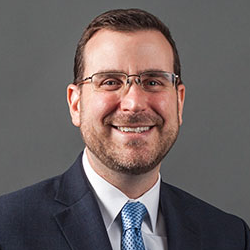
Adam Mossoff
Professor of Law
Antonin Scalia Law School, George Mason University
Adam Mossoff is Professor of Law at Antonin Scalia Law School, George Mason University. He is a Senior Fellow and Chair of the Forum for Intellectual Property at the Hudson Institute, and he is a Visiting Intellectual Property Fellow at The Heritage Foundation for 2019-2020. He is Chair of the Intellectual Property Working Group of the Regulatory Transparency Project at the Federalist Society. At Scalia Law, he teaches a wide range of courses at the law school, including patent law, trade secrets, trademark law, property law, remedies, and internet law. He has published extensively on the theory and history of how patents and other intellectual property rights are private property rights that should be legally secured to their owners and licensed or otherwise transferred as commercial assets in the marketplace. His research has been cited by the Supreme Court, by the Court of Appeals for the Federal Circuit, and by federal agencies.
Professor Mossoff has been invited to testify five times before the Senate and the House of Representatives on proposed patent legislation. His writings on patent policy have appeared in the Wall Street Journal, New York Times, Forbes, The Hill, Politico, and in other media outlets. He is a member of the Intellectual Property Rights Policy Committee of ANSI and the Academic Advisory Committee of the Copyright Alliance. He has served as past Chair and Vice-Chair of the Intellectual Property Committee of the IEEE-USA.

Recent Articles by Adam Mossoff
The European Union is considering a new regulatory regime for the licensing and litigation of standard essential patents (SEPs) that will destabilize the global telecommunications market. This proposed regulatory regime is unbalanced in favoring implementers over innovators, and thus it threatens to hamstring the explosive technological and economic growth in this vital sector of the modern innovation economy. Although the EU has finally awoken to the competitive and geopolitical threat posed by China, this regulatory proposal undermines efforts by the EU and the United States to sustain their global technological leadership.
For well over a year, Senator Elizabeth Warren (D-MA) and some members of Congress have engaged in a campaign to urge the Health and Human Services Secretary Xavier Becerra to break patents on pharmaceuticals to lower drug prices by invoking a century-old statute, Title 28 of the U.S. Code 1498. This is their “game plan”: HHS should contract with generic drug companies willfully to infringe pharmaceutical patents, thereby requiring any damages to be paid from public funds. This strategy took a new tack in early March 2023, when the Biden Administration’s Justice Department filed a surprise “Statement of Interest” in a private lawsuit on behalf “the Government and its Department of Health and Human Services and the Department of Defense.” The case, filed in Delaware federal court, was initiated by Arbutus Biopharma and Genevant Sciences, which allege that that patents they own were infringed by Moderna in producing its version of the COVID-19 vaccine.


![[IPWatchdog Logo]](https://ipwatchdog.com/wp-content/themes/IPWatchdog%20-%202023/assets/images/temp/logo-small@2x.png)